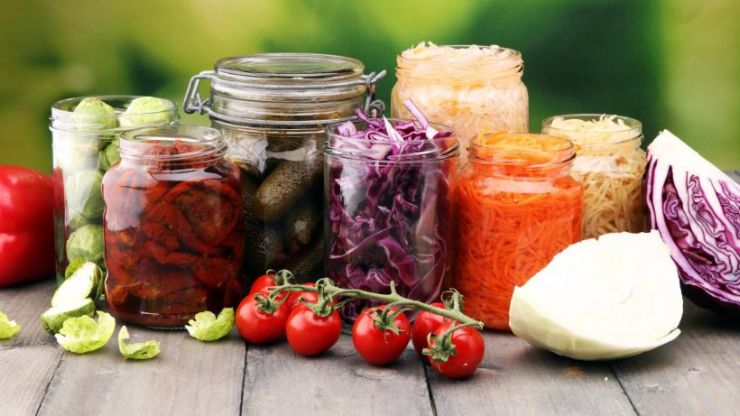Probiotics in Fermented Foods – The use of probiotics in fermented foods represents a fascinating intersection of food science, nutrition, and health. Probiotics, defined as live microorganisms that confer health benefits when consumed in adequate amounts, have gained immense popularity due to their positive impact on gut health, immunity, and overall well-being.
This introduction serves as a brief overview of the significance of probiotics in fermented foods, highlighting their pivotal role in promoting health and wellness.
Fermented foods are a diverse category encompassing items such as yogurt, kimchi, sauerkraut, kombucha, and various dairy products, all of which undergo microbial transformation during their production. Probiotics play a crucial role in these transformations, contributing to the development of unique flavors, textures, and enhanced nutritional profiles.
The synergistic relationship between probiotics and the fermentation process has led to the widespread adoption of these foods as functional and health-promoting choices in modern diets. This outline delves into various aspects of probiotics in fermented foods, examining their types, health benefits, selection, challenges, regulation, and future trends.
Table of Contents
ToggleDefinition of Fermented Foods
Fermented foods are those that have undergone a natural process of microbial transformation, which typically involves the activity of bacteria, yeast, or molds. This process results in changes to the flavor, texture, and nutritional content of the original food.
Also, Read – Fermented Foods for Improved Digestion
Common Fermented Foods
Yogurt
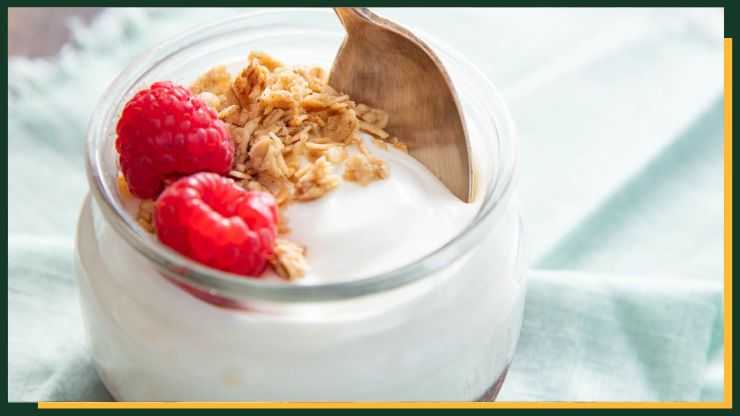
Yogurt is a dairy product created by fermenting milk with lactic acid bacteria. The bacteria consume the milk’s sugars, converting them into lactic acid, which thickens and flavors the yogurt. It is a rich source of probiotics, which promote gut health.
Yogurt can be enjoyed plain or with added fruits, honey, or other toppings, and it’s a versatile ingredient in both savory and sweet dishes. Its creamy texture and tangy taste make it a popular and nutritious choice for breakfast or as a snack.
Sauerkraut
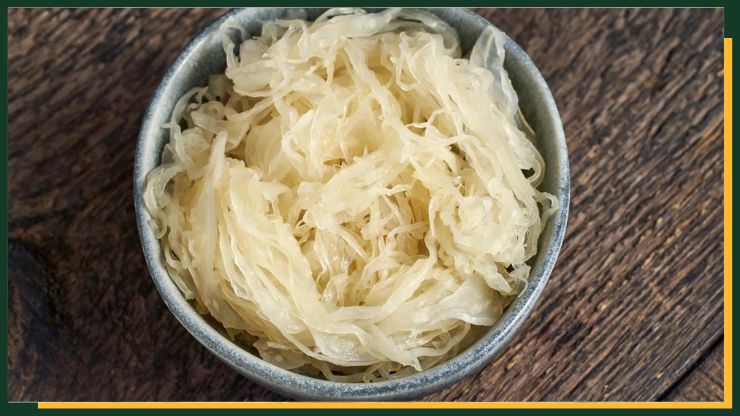
Sauerkraut is a traditional German condiment made from finely shredded cabbage that undergoes a natural fermentation process. During fermentation, lactic acid bacteria, particularly Lactobacillus, transform the sugars in cabbage into lactic acid, which preserves the cabbage and imparts a tangy flavor.
The fermentation process softens the cabbage while retaining its crunch. Sauerkraut is a versatile addition to various dishes, including hot dogs, sandwiches, and as a side dish. It is known for its probiotic benefits, which can support digestive health. This fermented cabbage dish is a staple in many European cuisines, offering a sour and zesty element to a wide range of culinary creations.
Kimchi

Kimchi is a spicy and pungent Korean side dish made by fermenting vegetables, primarily Napa cabbage and Korean radishes, with a mixture of seasonings such as chili pepper flakes, garlic, ginger, and salt. The fermentation process, typically achieved by lactic acid bacteria, gives kimchi its signature tangy and umami-rich flavor.
Kimchi is a staple in Korean cuisine and is often served as a condiment or accompaniment to meals. It’s known for its probiotic properties, which contribute to a healthy gut microbiome. This iconic dish offers a unique combination of spicy, savory, and slightly sour flavors and has gained popularity worldwide for its bold and complex taste.
Also, Read – Pineapple Turmeric Sauerkraut Recipe
Kombucha

Kombucha is a fermented tea beverage created by fermenting sweetened tea with a symbiotic culture of bacteria and yeast (SCOBY). The SCOBY, often called the “mother,” consumes the sugar and converts it into organic acids, carbonation, and a range of flavorful compounds.
This process results in a tangy, slightly effervescent drink with a sweet-tart taste profile. Kombucha is enjoyed for its unique flavor, which can be enhanced with various fruit, herbs, or spices during a second fermentation.
It’s also prized for potential health benefits, including probiotics and antioxidants. Kombucha has gained popularity as a trendy and naturally carbonated alternative to sugary soft drinks.
Miso
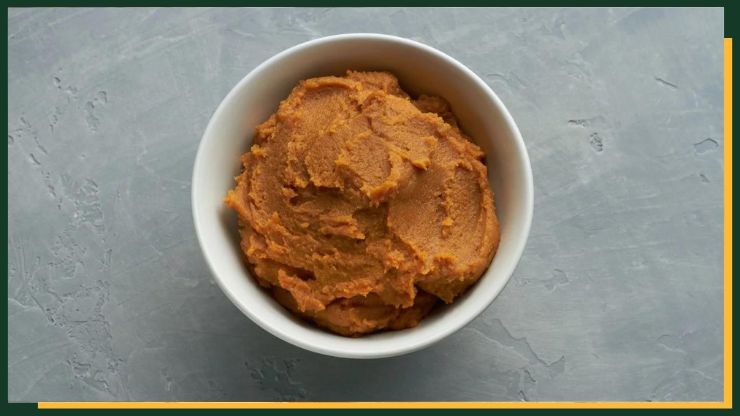
Miso is a traditional Japanese seasoning made by fermenting soybeans, salt, and often grains like rice or barley with koji, a type of mold. The mixture is aged for several months to several years, resulting in a thick paste with a rich, savory umami flavor.
Miso comes in various colors, ranging from light yellow to deep brown, each with its own intensity and taste. It’s a fundamental ingredient in Japanese cuisine, used to make miso soup, marinades, dressings, and more.
Beyond its culinary uses, miso provides essential probiotics, minerals, and amino acids, making it a nutritious and flavorful component in a variety of dishes.
Don't just scroll, subscribe!
BuzzTrail's unique web-stories are the cure for boredom you've been waiting for.
Tempeh
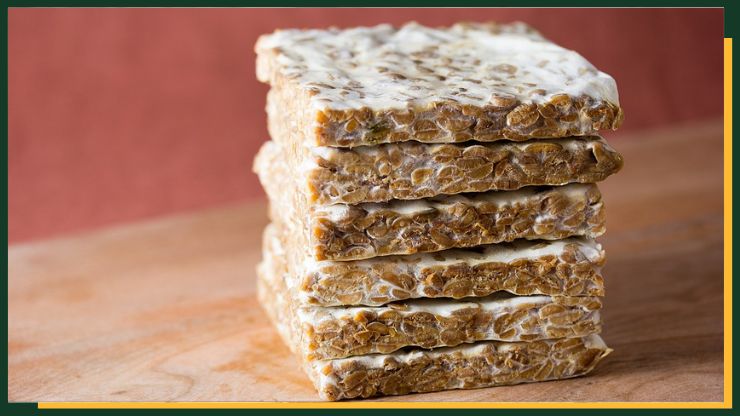
Tempeh is a plant-based protein source originating from Indonesia. It’s made by fermenting cooked soybeans with a specific mold called Rhizopus oligosporus. This fermentation process binds the soybeans together into a firm cake-like structure with a nutty and slightly earthy flavor.
Tempeh is a versatile meat substitute popular among vegetarians and vegans for its high protein content and unique texture. It can be sliced, diced, marinated, and used in various recipes, such as stir-fries, sandwiches, and salads.
Besides being a protein powerhouse, tempeh offers beneficial probiotics, vitamins, and minerals, making it a nutritious choice for those seeking a plant-based, health-conscious diet.
Kefir
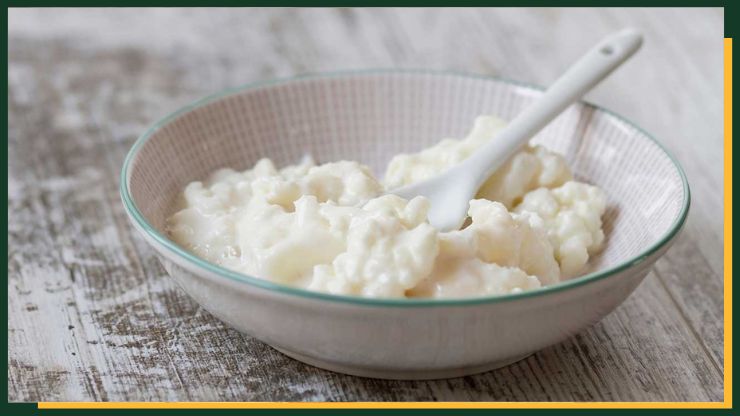
Kefir is a fermented milk beverage known for its tangy taste and probiotic properties. It’s made by adding kefir grains, which are a combination of bacteria and yeast cultures, to milk (or milk alternatives like coconut or soy milk).
The grains ferment the milk, converting lactose into lactic acid, resulting in a thinner, drinkable yogurt-like product. Kefir is a rich source of beneficial probiotics, which support gut health and the immune system. It’s also packed with vitamins, minerals, and proteins.
Kefir can be consumed on its own, blended into smoothies, or used as a base for salad dressings and dips, offering a refreshing and nutritious addition to one’s diet.
Sourdough Bread
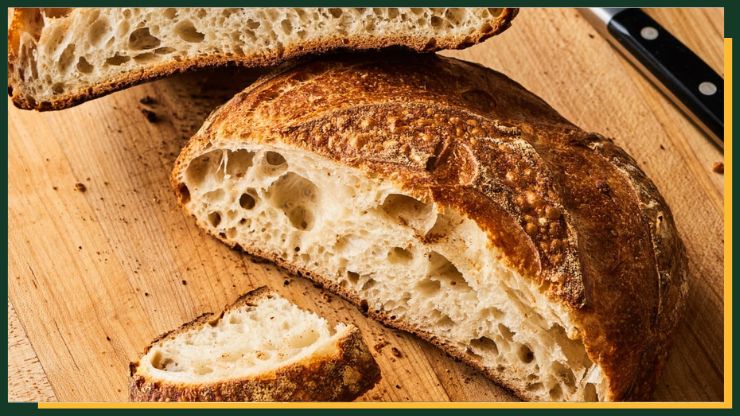
Sourdough bread is a type of bread made through a natural fermentation process, using a starter culture containing wild yeast and lactobacilli bacteria. The fermentation, which can take several hours to days, gives sourdough its distinct flavor, chewy crust, and airy crumb.
This bread is leavened without commercial yeast, relying solely on the wild microbes from the starter. Sourdough’s long fermentation process breaks down gluten and phytic acid, making it easier to digest and often a suitable choice for those with gluten sensitivity.
Its signature tangy taste, versatile nature, and artisanal qualities have made sourdough a beloved staple in baking traditions worldwide, with endless variations and recipes.
Role Of Probiotics in Fermented Foods
- Probiotics are key players in the fermentation process, as they convert sugars and other compounds into lactic acid, acetic acid, and ethanol, which help preserve and flavor the food.
- Probiotic bacteria and yeast strains can outcompete harmful microorganisms, leading to a safer end product.
- Probiotic fermentation can enhance the shelf life and nutritional value of foods.
Health Benefits of Probiotics in Fermented Foods
Gut Health
Improved Digestion:
- Probiotics help break down food and enhance nutrient absorption in the digestive tract, leading to better overall digestion.
- Beneficial microorganisms can alleviate symptoms of indigestion, bloating, and gas.
Microbiota Balance:
- Probiotics contribute to a balanced gut microbiota by promoting the growth of beneficial bacteria and inhibiting harmful pathogens.
- This balance is associated with improved gut health, reduced inflammation, and lower risk of digestive disorders.
Immune System Support
Enhanced Immune Response:
- The gut is closely connected to the immune system, and probiotics play a role in modulating immune responses.
- Consuming probiotics can help strengthen the body’s defense against infections and diseases.
Reduced Risk of Infections:
- Probiotic-rich diets are linked to lower susceptibility to common infections, such as respiratory and gastrointestinal illnesses.
- Probiotics may stimulate the production of antibodies and immune cells.
Other Potential Health Benefits
Weight Management:
- Some probiotic strains have been associated with weight regulation and may aid in weight loss efforts.
- They can influence appetite, fat metabolism, and inflammation, potentially supporting weight management.
Mental Health:
- Emerging research suggests a connection between gut health and mental well-being, known as the gut-brain axis.
- Probiotics may have a role in reducing symptoms of anxiety, depression, and stress.
Skin Health:
- Probiotics’ influence on the gut can also impact skin health by reducing inflammation and improving conditions like acne and eczema.
Allergies and Autoimmune Disorders:
- Probiotics may help modulate the immune system, reducing the risk of allergies and autoimmune diseases by maintaining immune balance.
Conclusion
In conclusion, the integration of probiotics into fermented foods offers a multifaceted approach to enhancing both taste and health. Probiotics play a pivotal role in improving gut health, supporting the immune system, and potentially addressing a range of health issues from digestion to mental well-being.
As this field continues to evolve, it is evident that probiotics in fermented foods are here to stay, contributing to a more holistic and health-conscious approach to nutrition. Embracing these foods as part of a balanced diet can be a delicious and beneficial step towards improved well-being.
FAQs
What are probiotics, and how do they relate to fermented foods?
What are probiotics, and how do they relate to fermented foods?
Probiotics are live microorganisms that provide health benefits when consumed in adequate amounts. They are often found in fermented foods as a result of the fermentation process, where beneficial bacteria or yeast cultures transform the food.
What are some common sources of probiotics in fermented foods?
What are some common sources of probiotics in fermented foods?
Common sources include yogurt, kefir, sauerkraut, kimchi, kombucha, and some cheese varieties. These foods contain live probiotic cultures that can benefit gut health.
How do probiotics in fermented foods support gut health?
How do probiotics in fermented foods support gut health?
Probiotics promote a balanced gut microbiota by increasing the population of beneficial bacteria. This balance is linked to better digestion, reduced inflammation, and a lower risk of digestive disorders.

